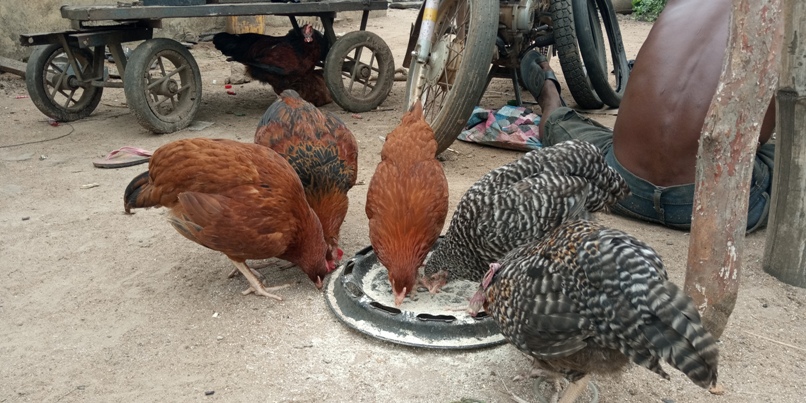Poultry (Gallus gallus domesticus) Farmers Community
Noiler Chicken in Nigeria: Revolutionizing Poultry Farming
- This topic is empty.
- AuthorPosts
- March 5, 2025 at 2:19 pm #580151
 Agric4ProfitsKeymaster
Agric4ProfitsKeymaster
Noiler chicken has become a game-changer in the Nigerian poultry industry, offering a unique blend of fast growth, high productivity, and adaptability to local conditions.
This breed was specifically developed to address some of the challenges faced by poultry farmers in Nigeria, such as the need for efficient meat production and resistance to diseases.
In this article, we will explore the characteristics of the Noiler chicken, the benefits it offers to Nigerian farmers, and how it is contributing to the future of poultry farming in the country.
1. Introduction to Noiler Chicken Breed
Noiler chicken is a crossbred poultry breed developed through the collaboration of Nigerian agricultural research institutions. It was created to meet the demand for a hardy, high-performance chicken breed suited to both the local climate and the specific needs of Nigerian farmers.
Unlike traditional local breeds, Noiler chickens have been bred for optimal meat production, offering faster growth rates and higher meat yields.
These chickens are a hybrid of broilers and local indigenous breeds, combining the advantages of both worlds: the hardiness and disease resistance of the local breeds with the fast growth and high feed conversion efficiency of commercial broilers. This makes Noiler chickens particularly suitable for small and medium-scale farmers in Nigeria.
2. Key Advantages of Noiler Chicken for Nigerian Farmers
The Noiler chicken breed presents numerous advantages that have made it increasingly popular among poultry farmers in Nigeria.
First, Noilers are highly adaptable to the local climate, requiring minimal management and making them less dependent on costly equipment or systems like heating or cooling, which can be common challenges in other poultry breeds.
Additionally, Noiler chickens have a robust immune system, making them resistant to diseases like Newcastle disease and avian influenza, which often affect poultry in tropical regions.
This disease resistance not only lowers the risk of large-scale mortality but also reduces the need for expensive veterinary interventions.
Noiler chickens also offer a quick turnaround time, reaching market weight in just a few months, providing farmers with a rapid return on investment. Furthermore, they require less feed to reach market weight compared to conventional broiler breeds, which significantly lowers feeding costs.
3. Noiler Chicken Farming Practices in Nigeria
To maximize the benefits of Noiler chicken farming in Nigeria, farmers need to adopt appropriate management practices that focus on the birds’ unique needs. The first step is providing a clean and comfortable environment for the chickens. While Noilers are hardy, they still require basic housing to protect them from extreme weather conditions and predators. The housing should be well-ventilated, dry, and spacious enough to prevent overcrowding, which can lead to health issues and stress.
In addition to housing, nutrition plays a critical role in the growth and development of Noiler chickens. A balanced diet with sufficient protein, vitamins, and minerals ensures that the birds reach their full potential.
Farmers should use locally available feed ingredients like maize, soybean, and fish meal, along with supplements that promote health and improve feed efficiency.
Regular health monitoring, vaccination, and biosecurity practices are essential to prevent diseases and ensure that the chickens remain in optimal condition.
4. Economic Benefits of Noiler Chicken Farming
Noiler chicken farming has proven to be economically viable for many farmers in Nigeria, especially when compared to traditional poultry farming methods.
The ability of Noiler chickens to grow rapidly and efficiently translates into higher productivity and profitability. Since Noilers require less feed to gain weight, farmers can reduce their feeding costs significantly, which makes them more cost-effective than other commercial poultry breeds.
Additionally, Noiler chickens can be sold both as broilers (meat chickens) and layers (egg production), providing farmers with flexibility in their business model.
The market demand for Noiler meat has been steadily growing due to its higher nutritional value and taste compared to other chicken varieties.
Furthermore, the hardiness of Noilers means that farmers can expect fewer losses due to disease outbreaks, which can be a significant concern in conventional poultry farming.
5. Challenges and Opportunities in Noiler Chicken Farming
While Noiler chicken farming offers many opportunities, there are also challenges that farmers must be aware of. One of the main challenges is access to quality day-old chicks, which is crucial for starting a successful Noiler farming venture.
Although the demand for Noiler chickens is growing, the supply of high-quality chicks remains limited in certain regions, and farmers may struggle to find reliable sources.
Another challenge is the lack of adequate technical knowledge and training in poultry management practices. Many small-scale farmers may not have access to the necessary resources or education to properly manage Noiler chickens.
However, there are significant opportunities to overcome these barriers. The Nigerian government, along with private organizations, is increasingly offering training programs, financial support, and technical assistance to encourage more farmers to adopt Noiler chicken farming.
Furthermore, the growing popularity of Noiler chickens in local markets presents a great opportunity for expansion and increased income for farmers who can successfully navigate the initial challenges.
In conclusion, Noiler chicken in Nigeria represents a significant advancement in poultry farming, offering farmers an adaptable, disease-resistant, and high-yielding breed that suits the country’s unique environmental conditions. With the right management practices,
Noiler chicken farming can be a highly profitable venture that helps meet the growing demand for poultry meat in Nigeria.
Despite some challenges, the potential for economic growth, along with the support from government and agricultural organizations, makes Noiler chicken farming a promising investment for the future of Nigerian agriculture.
Read Also: Does Noiler Lay Eggs Every Day?
- AuthorPosts
- You must be logged in to reply to this topic.

